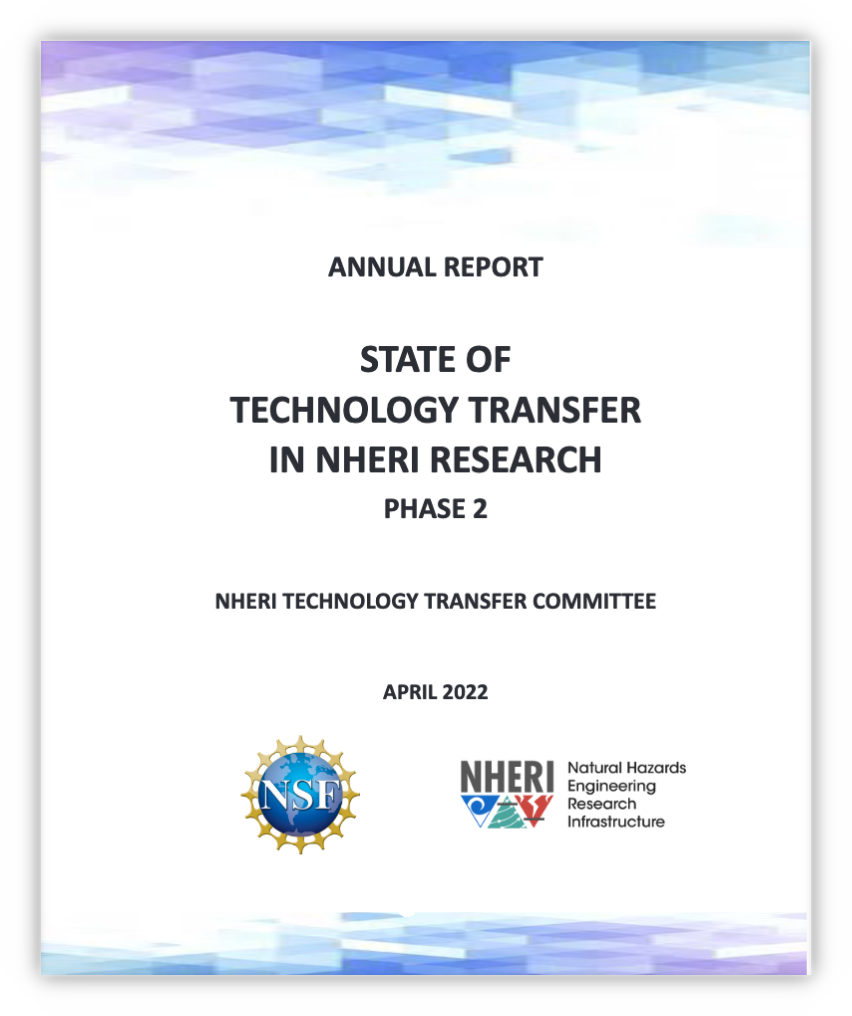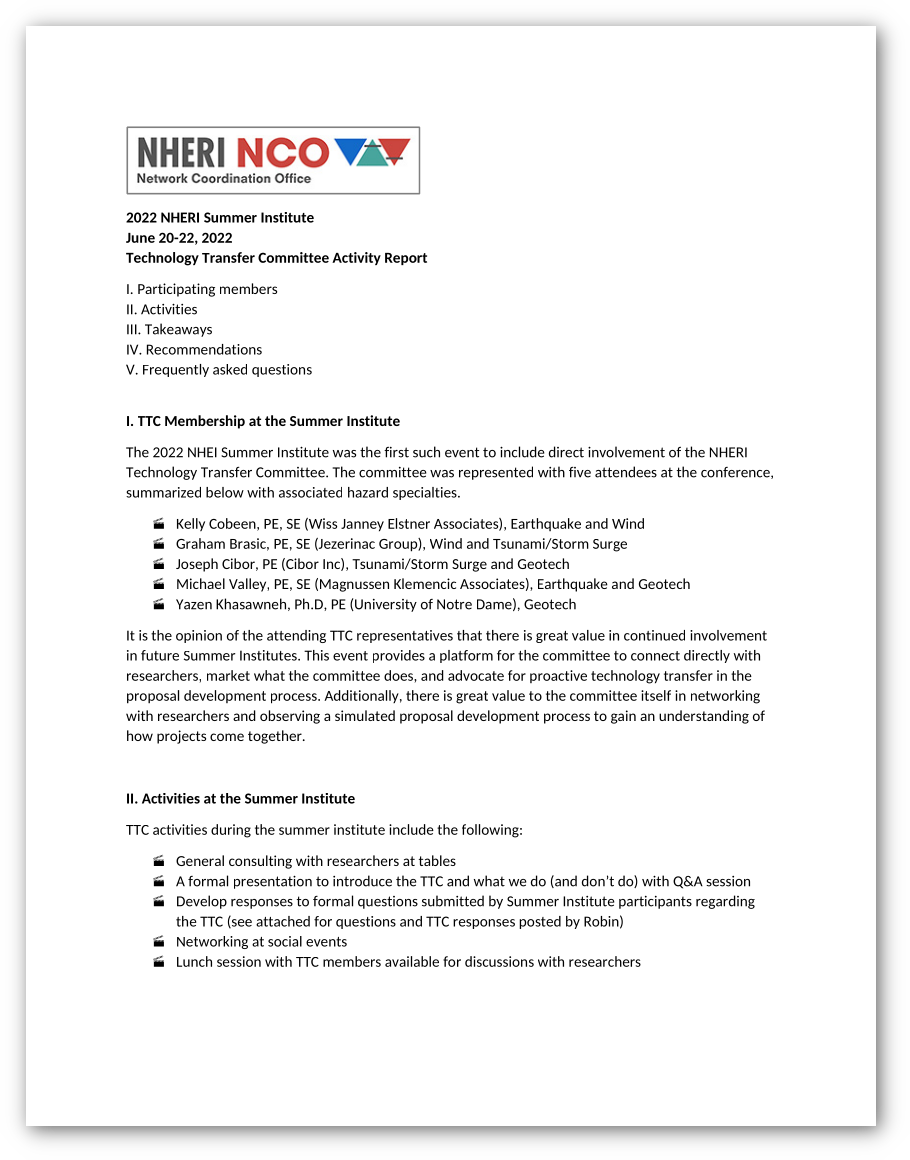NHERI Network Coordination Office
Technology Transfer Committee (TTC)
Aiding NHERI Research Into Practice
The Technology Transfer Committee (TTC) is a NHERI-sponsored group of volunteer practitioners and decision makers focused on strengthening the tie between NHERI researchers and the implementers of NHERIdeveloped technology. The members shall be experienced in contributing to the development of design guidelines, technical briefs, building/infrastructure codes and standards and technical seminars. A primary task will be to review the results of NHERI research projects to identify findings that could immediately lead to improvements in the design process that will result in mitigation of risk due to natural hazards. Other tasks that will result in stronger ties between NHERI researchers and the user community will be identified by the committee. Initially, as time and funding permits, reviews of NEES research may also be conducted.
Technology Transfer from the Natural Hazards Engineering Research Infrastructure (NHERI)
Frontiers in Built Environment Special Collection, June 2023
Technology transfer can be defined many ways, but in this collection of five research papers, the term entails the systematic transference of scientific research results to practical tasks. The research product may be a novel design, an effective process, a tool or a set of tools.
2022 NHERI Technology Transfer Report Now Available
Members of the NHERI Technical Transfer Committee, a core working group within the NHERI Network Coordination Office, seek to gain understanding of the overall attitude of NHERI researchers concerning technology transfer.
The TTC surveyed principal investigators of select CMMI NSF awards regarding plans for implementing technologies under investigation.
The resulting TTC reports provide succinct summations of the projects, data that may be of interest to engineering practitioners and researchers in cognate fields. The April 2022 report is the second phase of the TTC study.
Both Technology Transfer Committee reports are available in the NCO Community Data repository:
DOWNLOAD the NHERI Tech Transfer reports from the Data Depot.
NHERI Technology Transfer Committee Report from the 2022 Summer Institute
For the first time, members of the NHERI Technical Transfer Committee attended the NHERI Summer Institute, an event for early-career researchers held each June at the University of Texas San Antonio. The TTC representatives found great value in attending the SI and look forward to continued involvement. The Summer Institute provides an opportunity to connect directly with researchers, explain what the committee does, and advocate for proactive technology transfer in the proposal development process.
DOWNLOAD the TTC report on the NHERI 2022 Summer Institute.
2021 NHERI Technology Transfer Committee Presentation
Learn about the NHERI Technology Transfer Committee and how it can support moving your research into practice.
Report from the TTC November 2019 Meeting
In November 2019 the Technology Transfer Committee held an in-person meeting of committee members in Alexandria, Virginia. Topics included the presentation of several NHERI projects the committee has identified as having implementation potential, the discussion of a proposed publication of TTC findings, and plans for future TTC tasks. A report about the meeting has been released, and the presentations shown have been published to the DesignSafe Data Depot.
Meeting Report (PDF) |
Presentations
|
White Paper Available:
Implementing NHERI Research Results
The NHERI Technology Transfer Committee has prepared a paper for the natural hazards community with guidelines on how to apply the results of NHERI reseach into future experiments and industry practices. It is the mission of the TTC to facilitate bridging this gap from research to the real world.
Mechanisms for Implementation of NHERI Research Results (PDF)
Composition of the TTC
The TTC is appointed by the NHERI Council and will be composed of leaders in the engineering community with expertise in the behavior, design and construction practices using a diverse range of building materials and technical expertise. An ex officio member from the NHERI Network Coordination Office (NCO) Strategic Committee will be appointed to keep the NCO leadership apprised of committee progress and coordinate any needs of the committee with the rest of the natural hazard community. The User Forum (UF) will appoint one of its members to the TTC. The rest of the committee will consist of an additional 15-20 members with 2-year terms, with the opportunity of re-appointment by the NHERI Council. The TTC members will be selected from the following design communities with the intent of representing as many as practical:
- Earthquake and tsunami
- Wind
- Coastal Engineering
- Concrete design and construction
- Masonry design and construction
- Wood design and construction
- Stone design and construction
- Geotechnical design and construction
- Architectural (building envelope)
- Lifeline infrastructure (electric power, communications, water, wastewater, gas and liquid fuel, and transportation systems and components [including roads, bridges, railroads, and harbors])
- Social sciences and policy
Organization
The committee will be led by a chair, initially a representative of the NCO Strategic Committee. Subsequent chairs will be elected from within the committee although a representative of the NCO Strategic Committee will always be on the committee. The committee will form four interest groups: Earthquake, Wind, Tsunami/Storm surge, and Geotechnical. Committee members may serve on several of these interest groups. Each interest group will have a leader, selected by the committee chair. The committee chair and the four interest group leaders will form an executive committee that will facilitate organized and coordinated reviews of NHERI research by the committee members.
Current Membership
- DeeDee Bennett (Social Science)
- David Bonowitz, SE (Earthquake, Wind)
- Graham Brasic (Flood, Wind)
- Joe Cibor, PE (Tsunami/Surge, Geotechnical)
- Kelly Cobeen, SE (Earthquake, Wind)
- Jim Harris (Wind, Geotechnical)
- Cherylyn Henry (Wind)
- William T Holmes, SE (Earthquake)
- Insung Kim, SE (Earthquake)
- Steve Kramer (Geotechnical)
- Phil Line (Earthquake, Wind, Tsunami/Surge)
- James O Malley, SE (Earthquake)
- Bonnie Manley (earthquake, wind, steel)
- Chris Rojahn (general)
- Seth Thomas, SE (Earthquake, Tsunami)
- Mike Valley, SE (Earthquake)
Questions? Comments?
If you have feedback for the Technology Transfer Committee or would like to contact them for any reason, the committee can be reached via the email address;
ttc-inquiry@designsafe-ci.org
Spread the Word About TTC
The Technology Transfer Committee needs help spreading the word about services it offers to the community. Share this flyer with anyone who the TTC can help bringing natural hazards research results into practice.
Review Process
The primary objective of the TTC will be to identify key research projects that have been completed in recent years in the broad subject areas of wind, surge, tsunami, inundation, and earthquake that could lead to new design, construction, or assessment guidelines and/or standards that will reduce the risk to civil infrastructure.
Ongoing (or completed) NHERI research projects will be assigned to the appropriate TTC interest group or groups by the executive committee. Publicly available descriptions of the research will be reviewed to judge the potential for implementable findings. Since the direction and detail of many research projects could change during the life of the project, ongoing review may be necessary by following the Experimental Facility website, and reviewing papers or reports.
When appropriate, promising results or conclusions will be described by the interest group in an Initial Review Report (IRR) (e.g. one page), to include the site and Principal Investigator, the general nature of the project, the specific conclusions or finding that may be implementable and the logical group or committee that would interested in implementation. It is not anticipated that direct contact with the researcher will be made at this review level.
Twice a year (or more frequently if justified) the IRRs will be reviewed by the whole committee to decide 1) if the researcher should be contacted for further information or clarification, 2) if the research conclusions/findings should be forwarded to the appropriate implementers, and 3) the nature and extent of the material to be forwarded. These review efforts will be managed and coordinated by the TTC Executive Committee.
Other Activities
Other activities related to strengthening ties between NHERI researchers and the broader user committee will be identified and prioritized by the committee. These activities could include:
- Determining appropriate topics for webinars to the community and proposing day-long, by invitation, web-based workshops (or in-person workshop with support of the NHERI Council) with the purpose of reviewing the results of key projects,
- If requested, the TTC could review newly-awarded or ongoing projects to advise investigators on how the results of the project can be more-easily implemented into practice. This advice may include suggestions for new/revised experimental parameters, additional simulations, key presentation venues, etc. Such reviews could also be made pre-submittal.
- The TTC could also establish a database of practitioners willing to participate as industry partners on research projects. This database would be available for researchers wanting to include a qualified practitioner in their research proposal team. In this way, the TTC may become a critical resource for natural hazard researchers, especially for early-career faculty with less experience implementing research results into practice.







